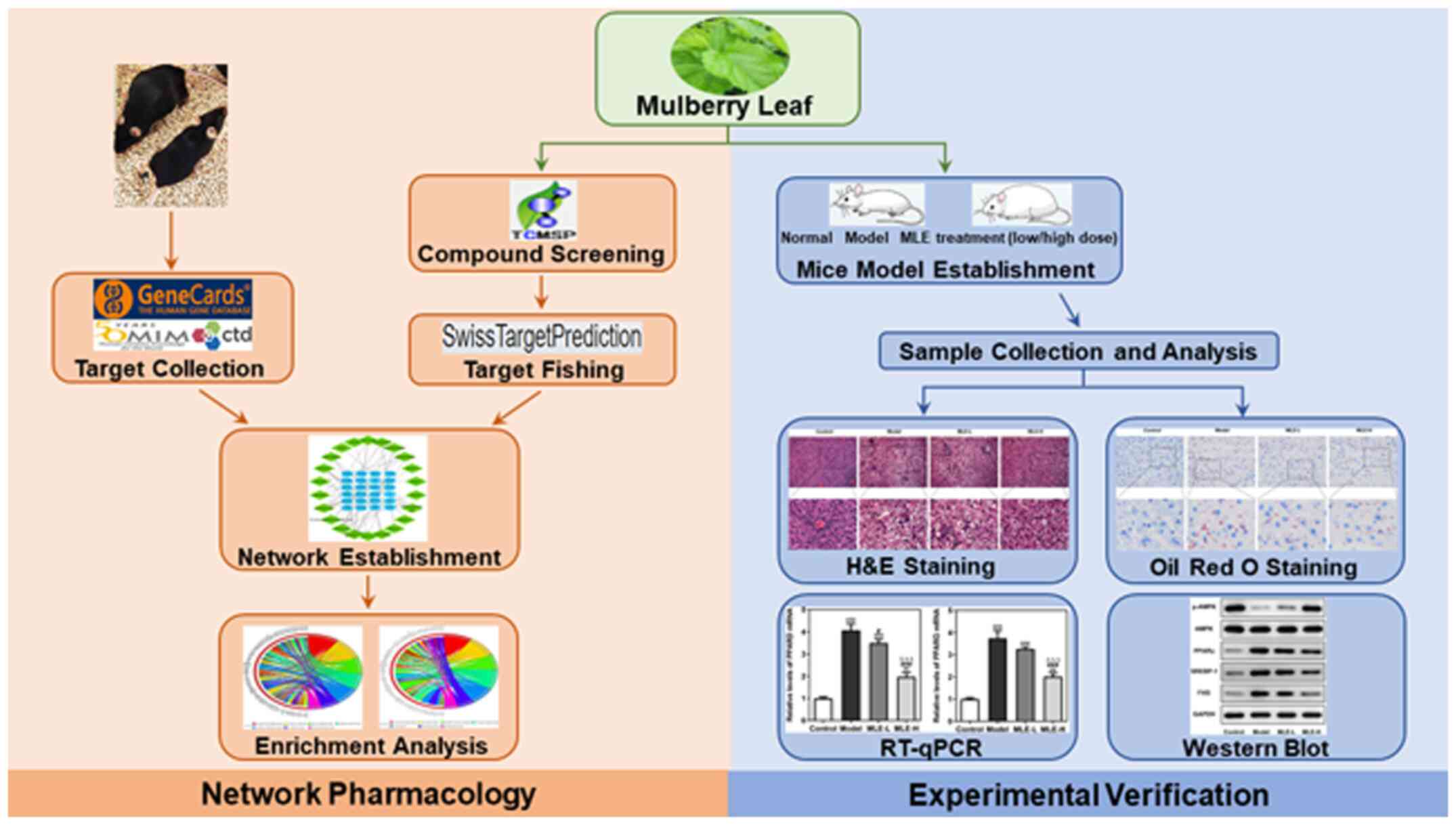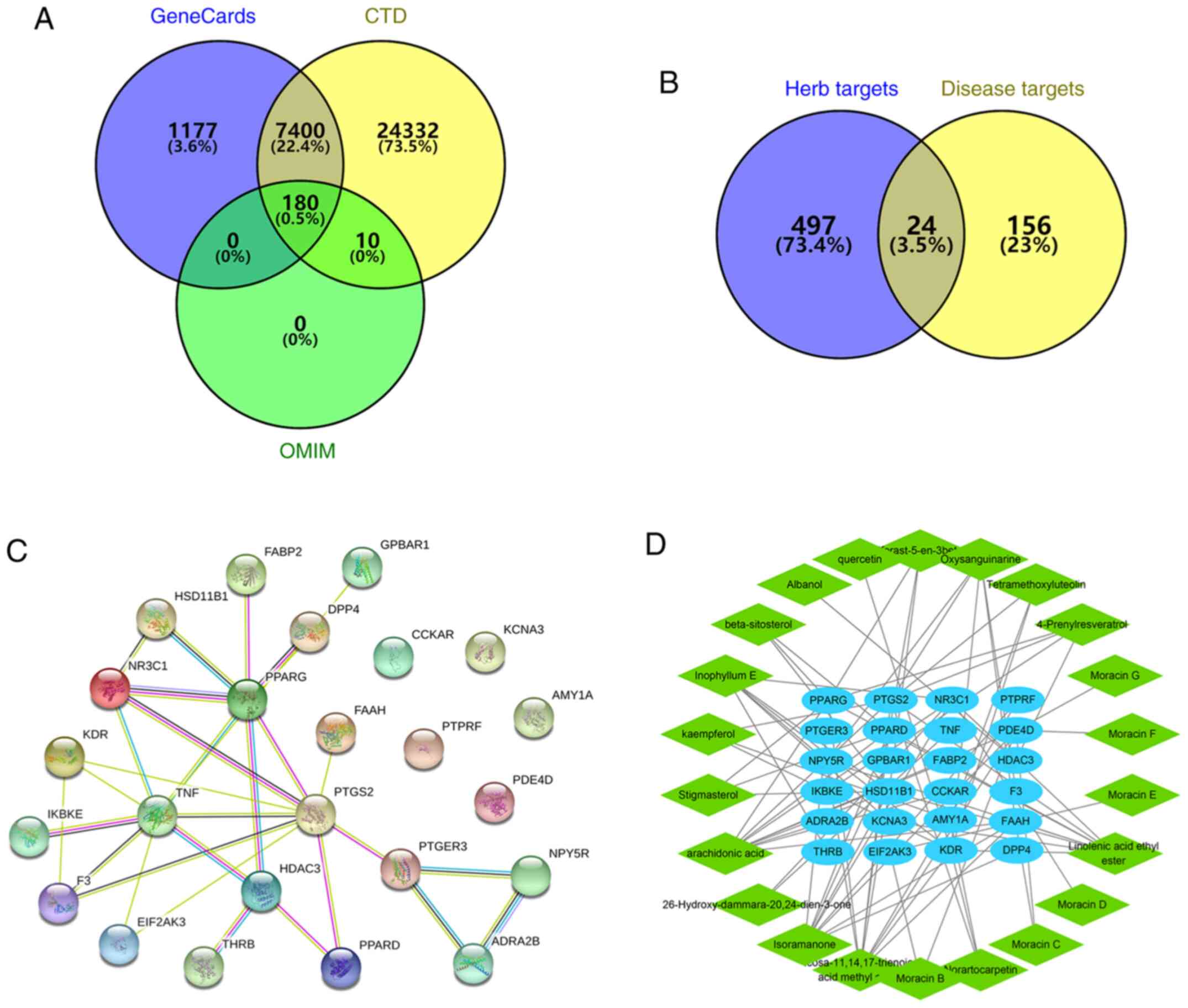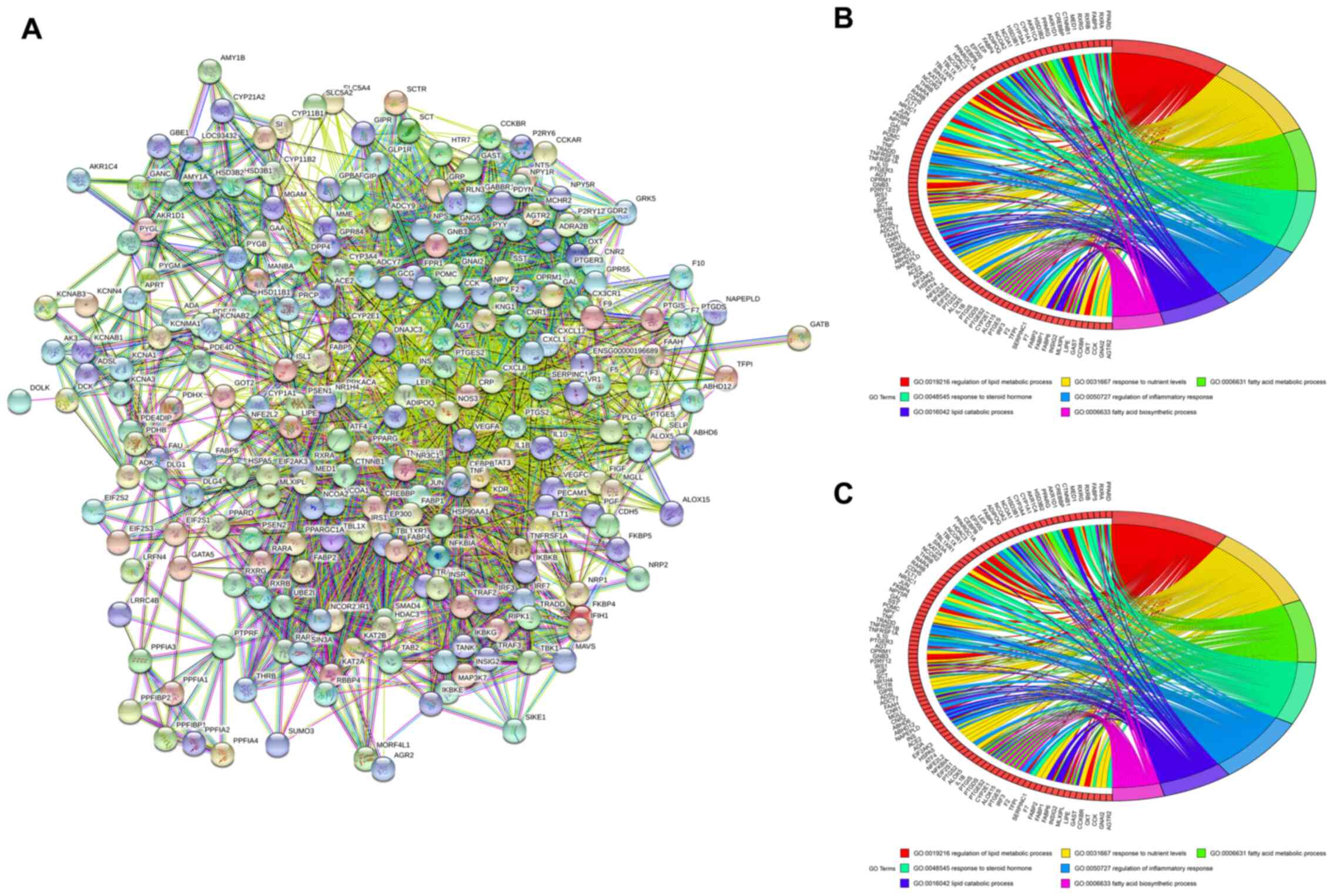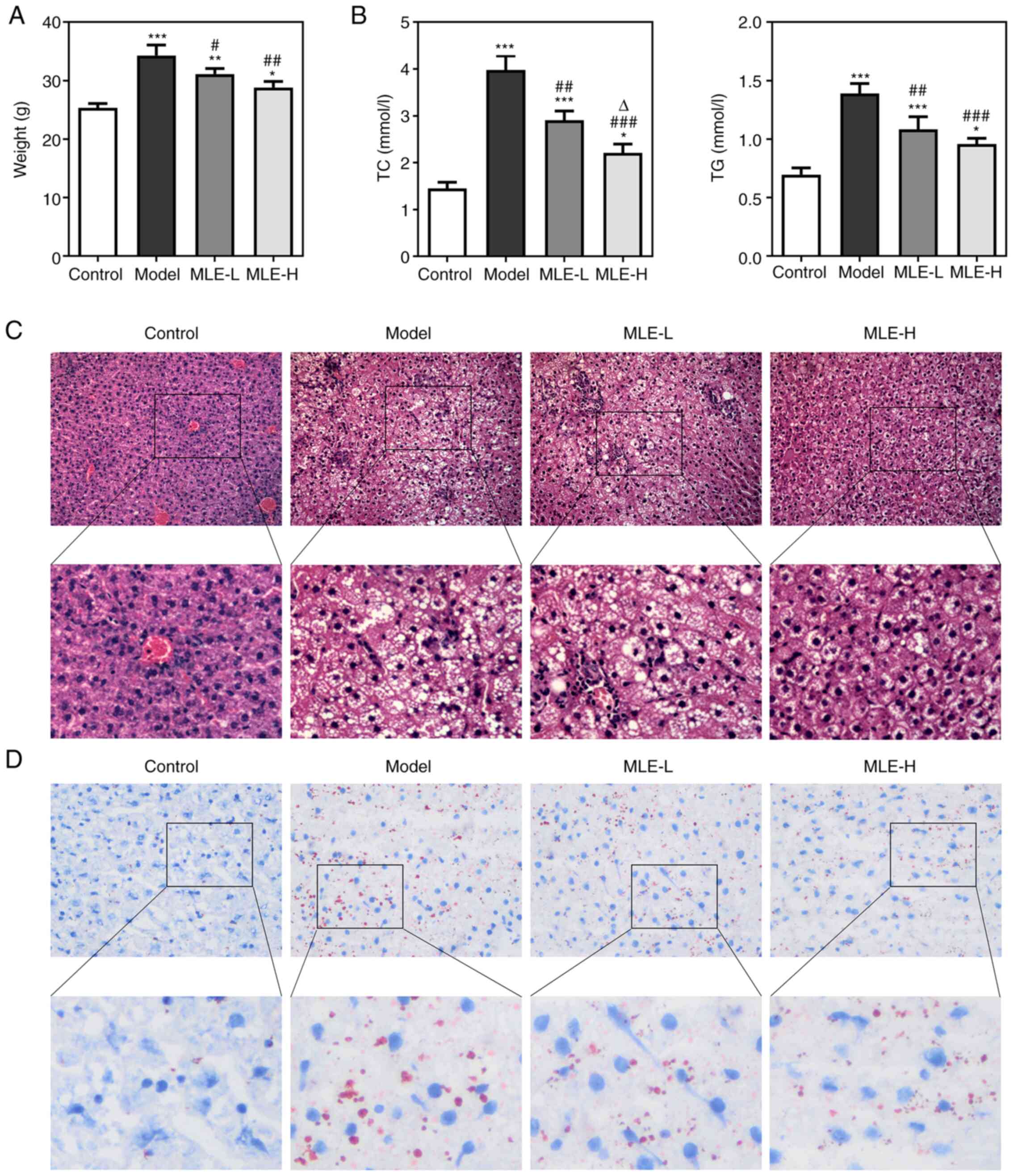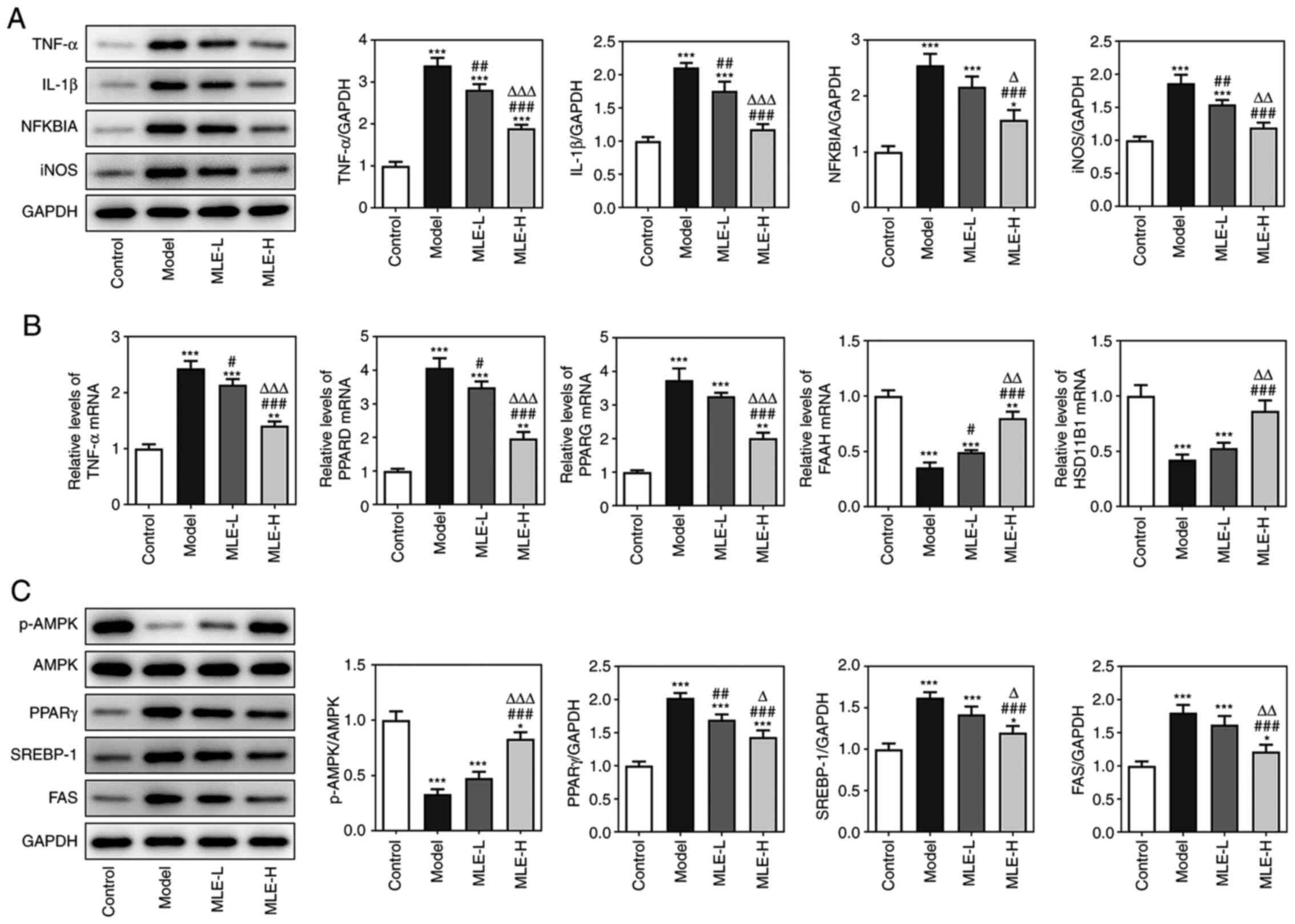|
1
|
Tsai AG and Bessesen DH: Obesity. Ann
Intern Med. 170:ITC33–ITC48. 2019.PubMed/NCBI View Article : Google Scholar
|
|
2
|
Jia A, Xu S, Ming J, et al: Epidemic
characteristics of obesity in China under various diagnostic
criteria. Chin J Diabetes Mellitus. 9:221–225. 2017.(In
Chinese).
|
|
3
|
Kim YJ, Lee HS, Kim YK, Park S, Kim JM,
Yun JH, Yu HY and Kim BJ: Association of metabolites with obesity
and Type 2 diabetes based on FTO genotype. PLoS One.
11(e0156612)2016.PubMed/NCBI View Article : Google Scholar
|
|
4
|
Lavie CJ, De Schutter A, Parto P, Jahangir
E, Kokkinos P, Ortega FB, Arena R and Milani RV: Obesity and
prevalence of cardiovascular diseases and Prognosis-The obesity
paradox updated. Prog Cardiovasc Dis. 58:537–547. 2016.PubMed/NCBI View Article : Google Scholar
|
|
5
|
Yang XD, Jiang S, Wang G, Zhang R, Zhang J
and Zhu JS: Link of obesity and gastrointestinal cancer: Crossroad
of inflammation and oxidative stress. J Biol Regul Homeost Agents.
29:755–760. 2015.PubMed/NCBI
|
|
6
|
Wang R, Li Y, Mu W, Li Z, Sun J, Wang B,
Zhong Z, Luo X, Xie C and Huang Y: Mulberry leaf extract reduces
the glycemic indexes of four common dietary carbohydrates. Medicine
(Baltimore. 97(e11996)2018.PubMed/NCBI View Article : Google Scholar
|
|
7
|
Park JM, Bong HY, Jeong HI, Kim YK, Kim JY
and Kwon O: Postprandial hypoglycemic effect of mulberry leaf in
Goto-Kakizaki rats and counterpart control Wistar rats. Nutr Res
Pract. 3:272–278. 2009.PubMed/NCBI View Article : Google Scholar
|
|
8
|
Yang X, Yang L and Zheng H: Hypolipidemic
and antioxidant effects of mulberry (Morus alba L.) fruit in
hyperlipidaemia rats. Food Chem Toxicol. 48:2374–2379.
2010.PubMed/NCBI View Article : Google Scholar
|
|
9
|
Andallu B, Suryakantham V, Lakshmi
Srikanthi B and Reddy GK: Effect of mulberry (Morus indica
L.) therapy on plasma and erythrocyte membrane lipids in patients
with type 2 diabetes. Clin Chim Acta. 314:47–53. 2001.PubMed/NCBI View Article : Google Scholar
|
|
10
|
Arabshahi-Delouee S and Urooj A:
Antioxidant properties of various solvent extracts of mulberry
(Morus indica L.) leaves. Food Chem. 102:1233–1240.
2007.
|
|
11
|
Ramadan EM, Abou-Taleb KA, Galal GF and
Abdel-Hamid SN: Antibacterial, antibiofilm and antitumor activities
of grape and mulberry leaves ethanolic extracts towards bacterial
clinical strains. Ann Agric Sci. 62:151–159. 2017.
|
|
12
|
Zeni AL and Dall'Molin M:
Hypotriglyceridemic effect of Morus alba L., Moraceae,
leaves in hyperlipidemic rats. Rev Bras Farmacogn. 20:130–133.
2010.
|
|
13
|
Lee YJ, Choi DH, Kim EJ, Kim HY, Kwon TO,
Kang DG and Lee HS: Hypotensive, hypolipidemic, and vascular
protective effects of Morus alba L. in rats fed an
atherogenic diet. Am J Chin Med. 39:39–52. 2011.PubMed/NCBI View Article : Google Scholar
|
|
14
|
Peng CH, Lin HT, Chung DJ, Huang CN and
Wang CJ: Mulberry leaf extracts prevent obesity-induced NAFLD with
regulating adipocytokines, inflammation and oxidative stress. J
Food Drug Anal. 26:778–787. 2018.PubMed/NCBI View Article : Google Scholar
|
|
15
|
Sheng Y, Liu J, Zheng S, Liang F, Luo Y,
Huang K, Xu W and He X: Mulberry leaves ameliorate obesity through
enhancing brown adipose tissue activity and modulating gut
microbiota. Food Funct. 10:4771–4781. 2019.PubMed/NCBI View Article : Google Scholar
|
|
16
|
Li Q, Liu F, Liu J, Liao S and Zou Y:
Mulberry leaf polyphenols and fiber induce synergistic antiobesity
and display a modulation effect on gut microbiota and metabolites.
Nutrients. 11(1017)2019.PubMed/NCBI View Article : Google Scholar
|
|
17
|
Yu G, Wang LG, Han Y and He QY:
ClusterProfiler: An Rpackage for comparing biological themes among
gene clusters. OMICS. 16:284–287. 2012.PubMed/NCBI View Article : Google Scholar
|
|
18
|
Walter W, Sánchez-Cabo F and Ricote M:
GOplot: An R package for visually combining expression data with
functional analysis. Bioinformatics. 31:2912–2914. 2015.PubMed/NCBI View Article : Google Scholar
|
|
19
|
Ann JY, Eo H and Lim Y: Mulberry leaves
(Morus alba L.) ameliorate obesity-induced hepatic
lipogenesis, fibrosis, and oxidative stress in high-fat diet-fed
mice. Genes Nutr. 10(46)2015.PubMed/NCBI View Article : Google Scholar
|
|
20
|
Livak KJ and Schmittgen TD: Analysis of
relative gene expression data using real-time quantitative PCR and
the 2(-Delta Delta C(T)) Method. Methods. 25:402–408.
2001.PubMed/NCBI View Article : Google Scholar
|
|
21
|
Zhang RZ, Yu SJ, Bai H and Ning K:
TCM-Mesh: The database and analytical system for network
pharmacology analysis for TCM preparations. Sci Rep.
7(2821)2017.PubMed/NCBI View Article : Google Scholar
|
|
22
|
Li S: Network target: A starting point for
traditional Chinese medicine network pharmacology. Zhongguo Zhong
Yao Za Zhi. 36:2017–2020. 2011.PubMed/NCBI(In Chinese).
|
|
23
|
Tang H, He S, Zhang X, Luo S, Zhang B,
Duan X, Zhang Z, Wang W, Wang Y and Sun Y: A network pharmacology
approach to uncover the pharmacological mechanism of XuanHuSuo
powder on osteoarthritis. Evid Based Complement Alternat Med.
2016(3246946)2016.PubMed/NCBI View Article : Google Scholar
|
|
24
|
Kim GN, Kwon YI and Jang HD: Mulberry leaf
extract reduces postprandial hyperglycemia with few side effects by
inhibiting α-glucosidase in normal rats. J Med Food. 14:712–717.
2011.PubMed/NCBI View Article : Google Scholar
|
|
25
|
Lee HJ, Na YG, Han M, Pham TMA, Lee H, Lee
HK, Myung CS, Han JH, Kang JS, Kim KT and Cho CW: Statistical
design of sustained-release tablet garcinia cambogia extract and
bioconverted mulberry leaf extract for anti-obesity. Pharmaceutics.
12(932)2020.PubMed/NCBI View Article : Google Scholar
|
|
26
|
Aramwit P, Supasyndh O, Siritienthong T
and Bang N: Mulberry leaf reduces oxidation and C-reactive protein
level in patients with mild dyslipidemia. Biomed Res Int.
2013(787981)2013.PubMed/NCBI View Article : Google Scholar
|
|
27
|
Huang J, Wang Y, Ying C, Liu L and Lou Z:
Effects of mulberry leaf on experimental hyperlipidemia rats
induced by high-fat diet. Exp Ther Med. 16:547–556. 2018.PubMed/NCBI View Article : Google Scholar
|
|
28
|
Tian S, Wang M, Liu C, Zhao H and Zhao B:
Mulberry leaf reduces inflammation and insulin resistance in type 2
diabetic mice by TLRs and insulin signalling pathway. BMC
Complement Altern Med. 19(326)2019.PubMed/NCBI View Article : Google Scholar
|
|
29
|
Marcelino G, Machate DJ, Freitas KC, Hiane
PA, Maldonade IR, Pott A, Asato MA, Candido CJ and Guimarães RCA:
β-Carotene: Preventive role for type 2 diabetes mellitus and
obesity: A review. Molecules. 25(5803)2020.PubMed/NCBI View Article : Google Scholar
|
|
30
|
Jiang H, Horiuchi Y, Hironao KY, Kitakaze
T, Yamashita Y and Ashida H: Prevention effect of quercetin and its
glycosides on obesity and hyperglycemia through activating AMPKα in
high-fat diet-fed ICR mice. J Clin Biochem Nutr. 67:74–83.
2020.PubMed/NCBI View Article : Google Scholar
|
|
31
|
Kurano M, Hasegawa K, Kunimi M, Hara M,
Yatomi Y, Teramoto T and Tsukamoto K: Sitosterol prevents
obesity-related chronic inflammation. Biochim Biophys Acta Mol Cell
Biol Lipids. 1863:191–198. 2018.PubMed/NCBI View Article : Google Scholar
|
|
32
|
Wang T, Wu Q and Zhao T: Preventive
effects of kaempferol on high-fat diet-induced obesity
complications in C57BL/6 mice. Biomed Res Int.
2020(4532482)2020.PubMed/NCBI View Article : Google Scholar
|
|
33
|
Mak IL, Lavery P, Agellon S, Rauch F,
Murshed M and Weiler HA: Arachidonic acid exacerbates diet-induced
obesity and reduces bone mineral content without impacting bone
strength in growing male rats. J Nutr Biochem.
73(108226)2019.PubMed/NCBI View Article : Google Scholar
|
|
34
|
Yaribeygi H, Farrokhi FR, Butler AE and
Sahebkar A: Insulin resistance: Review of the underlying molecular
mechanisms. J Cell Physiol. 234:8152–8161. 2019.PubMed/NCBI View Article : Google Scholar
|
|
35
|
Hammarstedt A, Gogg S, Hedjazifar S,
Nerstedt A and Smith U: Impaired adipogenesis and dysfunctional
adipose tissue in human hypertrophic obesity. Physiol Rev.
98:1911–1941. 2018.PubMed/NCBI View Article : Google Scholar
|
|
36
|
Poblete JMS, Ballinger MN, Bao S,
Alghothani M, Nevado JB Jr, Eubank TD, Christman JW and Magalang
UJ: Macrophage HIF-1α mediates obesity-related adipose tissue
dysfunction via interleukin-1 receptor-associated kinase M. Am J
Physiol Endocrinol Metab. 318:E689–E700. 2020.PubMed/NCBI View Article : Google Scholar
|
|
37
|
Yao L, Bhatta A, Xu Z, Chen J, Toque HA,
Chen Y, Xu Y, Bagi Z, Lucas R, Huo Y, et al: Obesity-induced
vascular inflammation involves elevated arginase activity. Am J
Physiol Regul Integr Comp Physiol. 313:R560–R571. 2017.PubMed/NCBI View Article : Google Scholar
|
|
38
|
Ding S, Chi MM, Scull BP, Rigby R,
Schwerbrock NM, Magness S, Jobin C and Lund PK: High-fat diet:
Bacteria interactions promote intestinal inflammation which
precedes and correlates with obesity and insulin resistance in
mouse. PLoS One. 5(e12191)2010.PubMed/NCBI View Article : Google Scholar
|
|
39
|
Tzanavari T, Giannogonas P and Karalis KP:
TNF-alpha and obesity. Curr Dir Autoimmun. 11:145–156.
2010.PubMed/NCBI View Article : Google Scholar
|
|
40
|
Ding Y, Guo ZR, Wu M, Chen Q, Zhou ZY, Yu
H, Zhang LJ, Liu JC and Luo WS: Effects of PPARD-87T >C and
interactions with single nucleotide polymorphisms in PPARA and
PPARG on abdominal obesity. Zhonghua Yi Xue Za Zhi. 92:1517–1521.
2012.PubMed/NCBI(In Chinese).
|
|
41
|
Landgraf K, Klöting N, Gericke M, Maixner
N, Guiu-Jurado E, Scholz M, Witte AV, Beyer F, Schwartze JT, Lacher
M, et al: The obesity-susceptibility gene TMEM18 promotes
adipogenesis through activation of PPARG. Cell Rep.
33(108295)2020.PubMed/NCBI View Article : Google Scholar
|
|
42
|
Zhang Y, Sonnenberg GE, Baye TM, Littrell
J, Gunnell J, DeLaForest A, MacKinney E, Hillard CJ, Kissebah AH,
Olivier M and Wilke RA: Obesity-related dyslipidemia associated
with FAAH, independent of insulin response, in multigenerational
families of Northern European descent. Pharmacogenomics.
10:1929–1939. 2009.PubMed/NCBI View Article : Google Scholar
|
|
43
|
Tomlinson JW, Moore JS, Clark PM, Holder
G, Shakespeare L and Stewart PM: Weight loss increases
11beta-hydroxysteroid dehydrogenase type 1 expression in human
adipose tissue. J Clin Endocrinol Metab. 89:2711–2716.
2004.PubMed/NCBI View Article : Google Scholar
|
|
44
|
Chedid MF, do Nascimento FV, de Oliveira
FS, de Souza BM, Kruel CR, Gurski RR, Canani LH, Crispim D and
Gerchman F: Interaction of HSD11B1 and H6PD polymorphisms in
subjects with type 2 diabetes are protective factors against
obesity: A cross-sectional study. Diabetol Metab Syndr.
11(78)2019.PubMed/NCBI View Article : Google Scholar
|
|
45
|
Zhu XJ, Dai JQ, Tan X, Zhao Y and Yang WJ:
Activation of an AMP-activated protein kinase is involved in
post-diapause development of Artemia franciscana encysted embryos.
BMC Dev Biol. 9(21)2009.PubMed/NCBI View Article : Google Scholar
|
|
46
|
Hardie DG: New roles for the LKB1->AMPK
pathway. Curr Opin Cell Biol. 17:167–173. 2005.PubMed/NCBI View Article : Google Scholar
|
|
47
|
Hardie DG: The AMP-activated protein
kinase pathway-new players upstream and downstream. J Cell Sci.
117:5479–5487. 2004.PubMed/NCBI View Article : Google Scholar
|
|
48
|
Herzig S and Shaw RJ: AMPK: Guardian of
metabolism and mitochondrial homeostasis. Nat Rev Mol Cell Biol.
19:121–135. 2018.PubMed/NCBI View Article : Google Scholar
|
|
49
|
Kubota N, Terauchi Y, Miki H, Tamemoto H,
Yamauchi T, Komeda K, Satoh S, Nakano R, Ishii C, Sugiyama T, et
al: PPAR gamma mediates high-fat diet-induced adipocyte hypertrophy
and insulin resistance. Mol Cell. 4:597–609. 1999.PubMed/NCBI View Article : Google Scholar
|
|
50
|
Jones JR, Barrick C, Kim KA, Lindner J,
Blondeau B, Fujimoto Y, Shiota M, Kesterson RA, Kahn BB and
Magnuson MA: Deletion of PPARgamma in adipose tissues of mice
protects against high fat diet-induced obesity and insulin
resistance. Proc Natl Acad Sci USA. 102:6207–6212. 2005.PubMed/NCBI View Article : Google Scholar
|
|
51
|
Crewe C, Zhu Y, Paschoal VA, Joffin N,
Ghaben AL, Gordillo R, Oh DY, Liang G, Horton JD and Scherer PE:
SREBP-regulated adipocyte lipogenesis is dependent on substrate
availability and redox modulation of mTORC1. JCI insight.
5(e129397)2019.PubMed/NCBI View Article : Google Scholar
|
|
52
|
Wu L, Zhang L, Li B, Jiang H, Duan Y, Xie
Z, Shuai L and Li J and Li J: AMP-Activated Protein Kinase (AMPK)
regulates energy metabolism through modulating thermogenesis in
adipose tissue. Front Physiol. 9(122)2018.PubMed/NCBI View Article : Google Scholar
|
|
53
|
Jeon SM: Regulation and function of AMPK
in physiology and diseases. Exp Mol Med. 48(e245)2016.PubMed/NCBI View Article : Google Scholar
|















